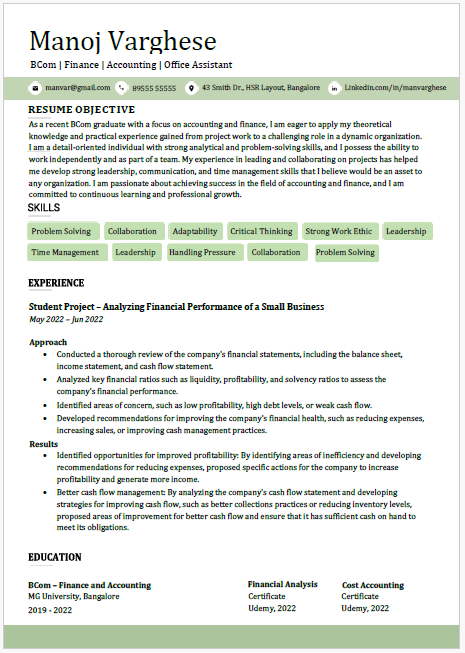Finance
BCom

About this template
This is a very professional resume which can significantly enhance your job prospects.
With its clean, modern design and industry-tailored layout, it highlights your skills and achievements, making a strong impression on recruiters.
Some important and useful technical skills for BCom, Finance
For a BCom graduate specializing in finance, several technical skills are crucial for success in the field. Here are ten important and useful technical skills:
1. Financial Analysis:
The ability to analyze financial statements, perform ratio analysis, and evaluate financial performance is fundamental. This skill helps in assessing the financial health of organizations, making informed investment decisions, and developing financial strategies.
2. Excel Proficiency:
Advanced skills in Microsoft Excel, including functions, pivot tables, and financial modeling, are essential. Excel is widely used for data analysis, budgeting, forecasting, and creating financial reports, making it a critical tool for financial professionals.
3. Accounting Software:
Familiarity with accounting software such as Tally, QuickBooks, or SAP is important for managing financial records, processing transactions, and generating financial statements. Proficiency in these tools streamlines financial operations and reporting.
4. Financial Reporting:
The ability to prepare and interpret financial reports, including income statements, balance sheets, and cash flow statements, is crucial. Accurate reporting ensures transparency and helps stakeholders make informed decisions based on financial data.
5. Budgeting and Forecasting:
Skills in creating and managing budgets, as well as forecasting financial performance, are vital. This involves analyzing historical data, predicting future financial outcomes, and developing plans to achieve financial goals.
6. Investment Analysis:
Understanding investment principles and techniques, such as evaluating stocks, bonds, and other securities, is key for making sound investment decisions. This includes knowledge of valuation methods, risk assessment, and portfolio management.
7. Data Analysis:
Proficiency in data analysis tools and techniques, such as statistical analysis and data visualization, helps in interpreting financial data and trends. This skill is important for making data-driven financial decisions and presenting findings effectively.
8. Regulatory Knowledge:
Knowledge of financial regulations and compliance requirements, such as IFRS, GAAP, and tax laws, is essential. Staying updated with regulatory changes ensures that financial practices adhere to legal standards and industry norms.
9. Risk Management:
The ability to identify, assess, and manage financial risks is crucial for protecting assets and ensuring financial stability. This includes understanding risk mitigation strategies and implementing measures to minimize potential financial losses.
10. Financial Modeling:
Skills in building financial models to project financial performance and evaluate different scenarios are important. Financial modeling helps in strategic planning, investment analysis, and decision-making by providing a structured approach to forecasting financial outcomes.
Conclusion:
These technical skills equip BCom finance graduates with the tools and knowledge needed to excel in financial roles and contribute to effective financial management and decision-making within organizations.